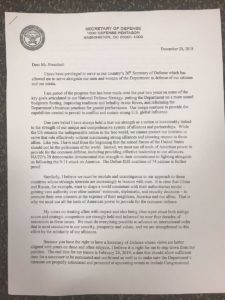The Crisis and Enabling Continue
“My views on treating allies with respect and also being clear eyed about both malign actors and strategic competitors are strongly held and informed by over four decades of immersion in these issues.”
[full text]
Dear Mr. President:
I have been privileged to serve as our country’s 26th Secretary of Defense which has allowed me to serve alongside our men and women of the Department in defense of our citizens and our ideals.
I am proud of the progress that has been made over the past two years on some of the key goals articulated in our National Defense Strategy: putting the Department on a more sound budgetary footing, improving readiness and lethality in our forces, and reforming the Department’s business practices for greater performance. Our troops continue to provide the capabilities needed to prevail in conflict and sustain strong U.S. global influence.
One core belief I have always held is that our strength as a nation is inextricably linked to the strength of our unique and comprehensive system of alliances and partnerships. While the US remains the indispensable nation in the free world, we cannot protect our interests or serve that role effectively without maintaining strong alliances and showing respect to those allies. Like you, I have said from the beginning that the armed forces of the United States should not be the policeman of the world. Instead, we must use all tools of American power to provide for the common defense, including providing effective leadership to our alliances. NATO’s 29 democracies demonstrated that strength in their commitment to fighting alongside us following the 9-11 attack on America. The Defeat-ISIS coalition of 74 nations is further proof.
Similarly, I believe we must be resolute and unambiguous in our approach to those countries whose strategic interests are increasingly in tension with ours. It is clear that China and Russia, for example, want to shape a world consistent with their authoritarian model — gaining veto authority over other nations’ economic, diplomatic, and security decisions — to promote their own interests at the expense of their neighbors, America and our allies. That is why we must use all the tools of American power to provide for the common defense.
My views on treating allies with respect and also being clear-eyed about both malign actors and strategic competitors are strongly held and informed by over four decades of immersion in these issues. We must do everything possible to advance an international order that is most conducive to our security, prosperity and values, and we are strengthened in this effort by the solidarity of our alliances.
Because you have the right to have a Secretary of Defense whose views are better aligned with yours on these and other subjects, I believe it is right for me to step down from my position. The end date for my tenure is February 28, 2019, a date that should allow sufficient time for a successor to be nominated and confirmed as well as to make sure the Department’s interests are properly articulated and protected at upcoming events to include Congressional posture hearings and the NATO Defense Ministerial meeting in February. Further, that a full transition to a new Secretary of Defense occurs well in advance of the transition of Chairman of the Joint Chiefs of Staff in September in order to ensure stability within the Department.
I pledge my full effort to a smooth transition that ensures the needs and interests of the 2.15 million Service Members and 732,079 DoD civilians receive undistracted attention of the Department at all times so that they can fulfill their critical, round-the-clock mission to protect the American people.
I very much appreciate this opportunity to serve the nation and our men and women in uniform.
James Mattis
John Kerry:
Former Secretary of State John Kerry reacts to Defense Secretary James Mattis’ resignation letters after DT announces U.S. troop withdrawal from Syria on ‘The 11th Hour with Brian Williams.’
Kerry believes Trump’s move to pull troops out of Syria is a gift for Vladimir Putin.
“This is the continuation of a crisis that too many people have been too content to live with…”
A Conversation with John Kerry’ at The Community Library in Sun Valley, Idaho (Ketchum)…Saturday, December 22nd, 4 pm. [live-streamed]
Fmr. Secretary of State John Kerry explains what it’s like to watch President Trump on the world stage and discusses current threats to the fabric of American democracy with Chris Hayes on #WITHpod.
Ezra Klein:
“Thursday wasn’t just Trump’s “day of chaos.” It was the Republican Congress’s day of enabling him, as every day is. The ongoing disaster roiling American governance is the Republican Congress’s fault, and they need to be held accountable for it.”
Our system of government was built by men who predicted and feared an out-of-control president. So they built another, more powerful branch of government able and expected to check a raging executive. Congress, not the president, comes first in the Constitution. In focusing so much on Trump, we focus too little on Congress’s Republican leadership, and the job they are failing to do.
So what will Senate Republicans do now? Are they going to ask Mattis to testify on how Trump really runs his foreign policy? Are they going to refuse to confirm anyone they think is less independent than Mattis to replace him? Or are they just going to send some distressed tweets and move on? The answer, I fear, is obvious.
Let me ask one other question: What would Senate Republicans do if they held the majority and this chaos was engulfing a Democratic White House?
The real story of this era is not Trump’s behavior. We can’t fault Trump for being Trump. As the lesson of his favorite parable goes, we knew damn well he was a snake when we took him in. But we can fault Republicans in Congress who are failing to do their jobs, and making a mockery of the constitutional system they claim to revere in the process.
Full article:
[Ezra Klein is the editor-at-large and founder of Vox. Before that, he was columnist and editor at the Washington Post, a policy analyst at MSNBC, and a contributor to Bloomberg. He’s written for the New Yorker and the New York Review of Books, and appeared on Face the Nation, Real Time with Bill Maher, The McLaughlin Report, the Daily Show, and many more.]




Leave a Reply